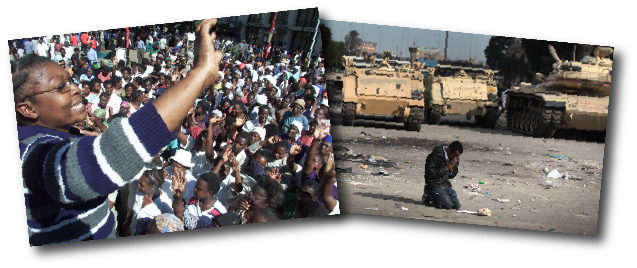 This live ICNC Academic Webinar took place on Wednesday, Nov. 12, 2014 at 12 p.m. EST.
This live ICNC Academic Webinar took place on Wednesday, Nov. 12, 2014 at 12 p.m. EST.
Based on a newly-published edited book Civil Resistance and Conflict Transformation. Transitions from Armed to Nonviolent Struggles (Routledge August 2014), this webinar will provide some insights on the interplay between civil resistance, armed insurgency and conflict transformation. Particular focus will be placed (both conceptually and empirically) on the phenomenon of armed groups shifting their conflict-waging strategies from violent to nonviolent means, especially in contexts which cannot be resolved by force but are also ‘unripe’ for conventional de-escalation methods such as negotiation and political integration. Relying on evidence from such various settings as South Africa, Palestine, Western Sahara, West Papua, Mexico, Colombia, Nepal and Egypt, the webinar talk will review the dynamics of organizational and strategic shifts from armed to unarmed conflict and factors inducing such transitions – from a change of leadership and a pragmatic re-evaluation of the goals and means of insurgency in the light of evolving inter-party power dynamics, to the search for new local or international allies and the cross-border emulation or diffusion of new repertoires of action.
Watch the webinar below:
Presenter:
 Dr. Véronique Dudouet is senior researcher and program director at the Berghof Foundation in Berlin. She has been coordinating participatory action research, training and policy advice activities on resistance and liberation movements in transition’ since 2005. She holds an MA (2001) and PhD (2005) in Conflict Resolution from the Department of Peace Studies, Bradford University, UK, as well as an MPhil in International Relations and Security and a BA in Political Science from the Institute d’Etudes Politiques, Toulouse, France.
Dr. Véronique Dudouet is senior researcher and program director at the Berghof Foundation in Berlin. She has been coordinating participatory action research, training and policy advice activities on resistance and liberation movements in transition’ since 2005. She holds an MA (2001) and PhD (2005) in Conflict Resolution from the Department of Peace Studies, Bradford University, UK, as well as an MPhil in International Relations and Security and a BA in Political Science from the Institute d’Etudes Politiques, Toulouse, France.
Her current research interests include transitions from armed to unarmed insurgencies, the role of external actors in nonviolent resistance, negotiation and third-party intervention in asymmetric conflict, inclusive post-war governance. As a scholar-activist, she has been involved in several anti-war and nonviolent campaigns, including as a volunteer with the International Solidarity Movement (ISM) in the Palestinian territories. She also carries out consultancy projects for various civil society organizations, state and international agencies (EU, OECD, UNDP).
Besides numerous publications in the fields of conflict transformation and peacebuilding, she has published numerous book chapters and academic articles on civil resistance, as well as a co-authored report (with Howard Clark, 2009) for the European Parliament on Nonviolent Civic Action in Support of Human Rights and Democracy, and an edited book on Civil Resistance and Conflict Transformation: Transitions from Armed to Nonviolent Struggle (Routledge 2014).